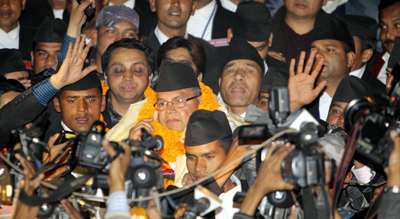Nepal’s new Prime Minister Jhalnath Khanal should be setting a new tone. Law and order–and with it, journalists’ security–have suffered in the seven months since Madhav Kumar Nepal resigned and has been filling in as interim leader. Khanal could be making public commitments to reversing the atmosphere of impunity that is promoting media attacks. Instead, he is struggling to form a new government amid challenges to his tenuous hold on power.
President Ram Baran Yadav swore in the new leader, a Communist Party of Nepal (United Marxist Leninist) member, on Sunday, according to reports. The country’s lawmakers had failed to select a leader during the previous 16 rounds of parliamentary elections. The Unified Communist Party of Nepal (Maoist), the largest party in a coalition with no majority, gave Khanal its support and secured his appointment, but it has already withdrawn its backing over stalled negotiations to fill key positions in the cabinet, the reports said. The previous prime minister, Madhav Kumar Nepal, also of the Communist Party of Nepal, stepped down in June 2010 over a dispute with the Maoists, news reports said.
Journalists have been attacked and threatened in different parts of the country during the political deadlock, according to CPJ research, local press freedom groups and international news reports. Here are some recent examples:
- Arjun Jamneli Rai and Bibek Bhattarai, journalists based in Pathari, Morang district, in the southern Terai plains, say they have been receiving threats via text messages sent to their cell phones for reporting on an illegal construction project involving sand from a local river, according to local news reports. Local Communist Party of Nepal leader Kishore Rai seized 1,000 copies of the Aujar daily on Feburary 6, the local newspaper Republica reported. Aujar had carried Arjun Jamneli Rai’s reporting on the story on February 3 and an editorial on February 4. Bhattarai, a Janabidroha weekly correspondent who also covered the story, is in hiding in Pathari, news reports said.
- Two men beat Naya Patrika reporter Milan Pariyar in the western district of Doti on Sunday, and accused him of biased reporting according to local press freedom group Freedom Forum and The Kathmandu Post.
- An unidentified group attacked Babu Ram Rayamajhi, a Buddha Awaj community radio journalist, in Kapilvastu district after he left work on February 1, according to local news reports. “They beat me mercilessly and threatened to kill me,” the reporter told the local press freedom group Freedom Forum. The motive for the attack was not clear.
- Three unidentified attackers stabbed Himal FM radio journalist Hemanta Choudhary with knives in Nepalgunj, western Nepal, as he left his office on January 2, according to local press freedom groups the Federation of Nepali Journalists and Freedom Forum, and local news reports. Choudhary was admitted to the hospital with serious injuries, according to the reports. The assailants accused him during the attack of reporting about them, but did not identify themselves, the reports said.
These frequent local confrontations are part of a larger, more concerning trend. Nepal appeared eighth on CPJ’s 2010 Impunity Index of countries where journalists are killed regularly and governments fail to solve the crimes.
Three media owners were murdered in unrelated attacks in 2010: The chairman of Channel Nepal television and the satellite Space Time Network Jamim Shah was shot in in Kathmandu; the chairman of the media company Today Group Arun Singhaniya was shot three times near his residence in Dhanusa district; and Devi Prasad Dhital, chairman of Radio Tulsipur FM, was killed by unidentified assailants as he was riding a motorcycle in Tulsipur, in Nepal’s mid-western district of Dang, according to CPJ research. CPJ is investigating whether those deaths were related to their work. Following those deaths, local journalists told CPJ that regardless of the motives in each case, they feared the murders had helped make their profession a target for criminal groups.
Politicians and political activists should be taking steps to enshrine media freedoms in the constitution, which international news reports say is due to be drafted by May this year. They should be building on the peace process which followed a decade-long civil war, and strengthening democratic institutions so that journalists are not drawn into violence between partisan political groups. They should be creating conditions where attacks on the press can be promptly investigated and prosecuted. Instead, they are all too often responsible for the attacks themselves.
